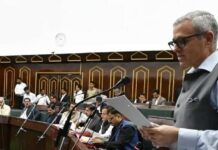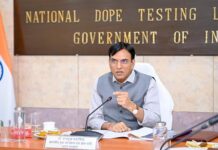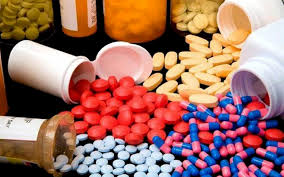MARCH 18:The Ministry of Health and Family Welfare notifies the National List of Essential Medicines (NLEM), which is incorporated as Schedule-I to the Drugs (Prices Control) Order, 2013 (DPCO, 2013). The National Pharmaceutical Pricing Authority (NPPA) under the Department of Pharmaceuticals (DoP) fixes ceiling prices of these scheduled medicines in accordance with the provisions of DPCO, 2013. All manufacturers and marketers of scheduled medicines are required to sell their products within the ceiling price (plus applicable Goods and Service Tax) fixed by the NPPA. Further, NPPA fixes the retail price of new drugs, as defined in DPCO, 2013. For applicant manufacturers and their marketers, who too are required to sell the new drug within the price notified by NPPA. In respect of non-scheduled formulations, manufacturers are required to not increase the Maximum Retail Price of the drugs launched by them by more than 10% during the preceding 12 months. As on 12.3.2025, ceiling prices of 928 scheduled formulations and retail prices of over 3,200 new drugs stood fixed by NPPA. The average price reduction due to fixation or refixation of prices under NLEM, 2022 was about 17%, resulting in estimated annual savings of approximately ₹3,788 crore to patients. Details of prices fixed by NPPA are available on its website (www.nppaindia.nic.in ).
Besides price regulation, Government has also enabled access to affordable essential medicines through Pradhan Mantri Bhartiya Janaushadhi Pariyojana (PMBJP), under which quality medicines are offered through Jan Aushadhi Kendras (JAKs) at rates that are typically 50% to 80% lower than the prices of branded medicines available in the market. In addition, under the Affordable Medicines and Reliable Implants for Treatment (AMRIT) initiative of the Department of Health and Family Welfare, medicines for the treatment of cancer, cardiovascular and other diseases, implants, surgical disposables and other consumables etc. are provided at significant discounts of up to 50% of market rates through AMRIT Pharmacy stores set up in some hospitals/institutions. Also, to ensure availability of essential drugs and reduce out-of-pocket expenditure of patients visiting public health facilities, Government has rolled out the Free Drugs Service Initiative under the National Health Mission under which financial support is provided to State and Union Territory Governments for 106 drugs at the Sub-Health Centre level, 172 drugs at the Primary Health Centre level, 300 drugs at the Community Health Centre level, 318 drugs at the Sub-District Health level and 381 drugs at the District Hospitals.
Currently, 2,047 medicines and 300 surgicals, medical consumables and devices are under the PMBJP scheme product basket, covering all major therapeutic groups, such as cardiovascular, anti-cancers, anti-diabetic, anti-infectives, anti-allergic and gastro-intestinal medicines and nutraceuticals etc. The Department of Pharmaceuticals has set the target to increase the product basket to 2,100 medicines and 310 surgicals, medical consumables and devices by 31.3.2025.
The prices of both scheduled and non-scheduled drugs are monitored by NPPA. Monitoring activities are based on references from State/UT Price Monitoring Resource Units (PMRUs), State Drugs Controllers (SDCs), market samples, market-based databases and complaints received through the Pharma Jan Samadhan (PJS) portal, Centralised Public Grievance Redress and Monitoring System (CPGRAMS) and other reliable sources. Instances of overcharging are dealt with by NPPA under relevant provisions of DPCO, 2013.


















